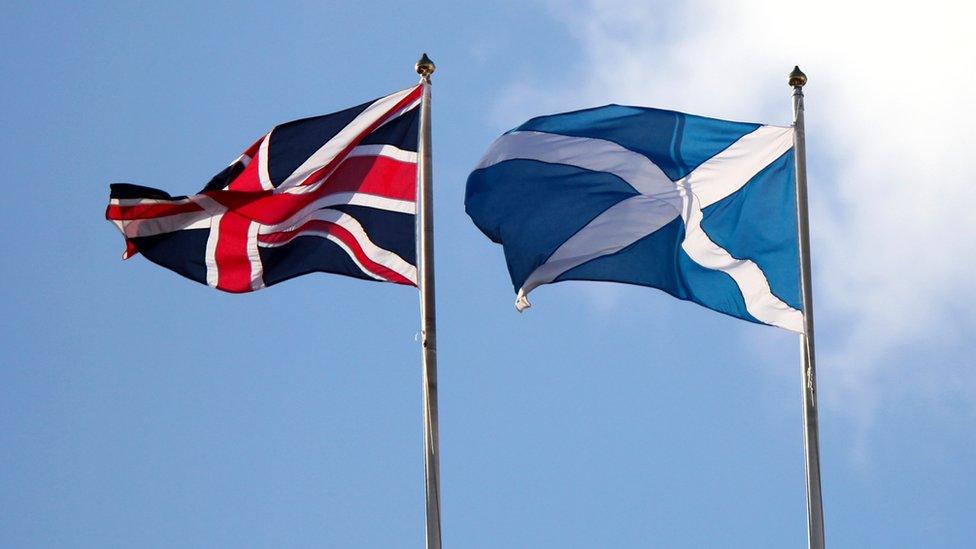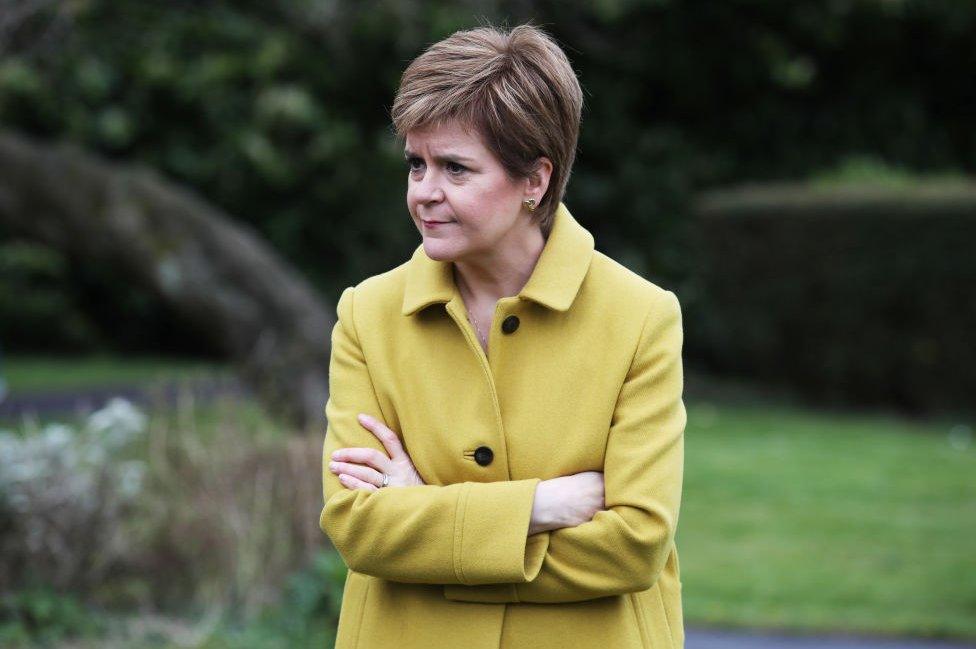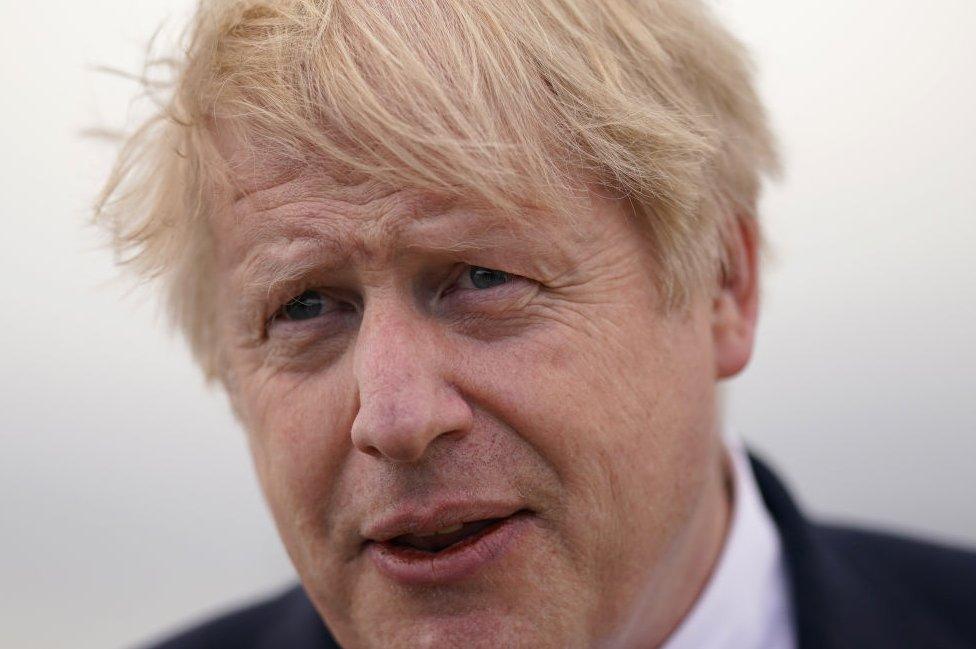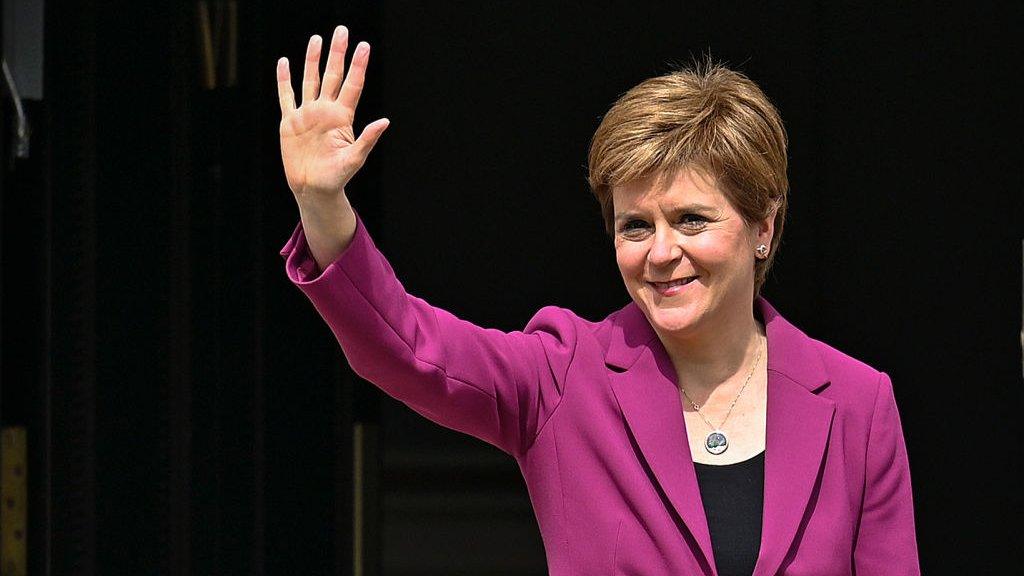Constitutional clash is coming... but not yet
- Published
- comments

The only way for there to be a successful referendum on Scottish independence is if both sides agree.
That's how they did it in 2014 with the Edinburgh agreement and the alternatives are messy and risky for both sides.
If the current stand-off between Nicola Sturgeon and Boris Johnson cannot be resolved, the first minister intends - at some point - to pass a referendum bill at Holyrood.
She dares the UK government to challenge the legislation in court which it may feel obliged to do because it considers such a vote to be beyond devolved powers.
'Change would follow'
The UK constitution - including the union between Scotland and England - is a matter reserved to Westminster by law.
However, it could be argued that reservation does not explicitly prevent Holyrood from consulting the public on independence.
Then again, a "yes" vote in any referendum would create an expectation that major constitutional change would follow, as it did in the advisory vote on Brexit.
These are the arguments the UK Supreme Court would have to work through.
At the weekend, both the UK cabinet minister Michael Gove and the first minister downplayed the prospect of a legal battle but that is what would inevitably happen unless the two sides make a deal.

Nicola Sturgeon would prefer to see support for independence running higher
UK government sources have made clear that just because they are not seeking to take legal action does not mean they would not go to court if a specific referendum proposal emerged.
Even if the UK government did not challenge, somebody surely would. The whisky industry tied up minimum alcohol pricing legislation in court for five years.
If the court ruled in Nicola Sturgeon's favour, that might enable a referendum but it could still face a unionist boycott which would de-legitimise the outcome.
If the court ruled in Boris Johnson's favour, that would thwart a referendum because Ms Sturgeon has made clear she would not hold an illegal vote.
However, Nicola Sturgeon could argue in those circumstances that the union was being held together by force of law rather than consent which would be a rotten look for the UK.
That might lead to a rise in support for independence.
The UK government could pass legislation to explicitly prevent Holyrood from having a referendum or to organise its own vote - options that carry similar risks.
The UK strategy for the moment seems to be to play for time by arguing that there can be another referendum at some unspecified point in the future but not now.

Boris Johnson's UK government is playing for time
They make the case that it would be irresponsible to have a referendum while we are still in a pandemic.
On that point, Boris Johnson and Nicola Sturgeon agree and appear to be in tune with Scottish public opinion.
There are other reasons the first minister is not in a rush. She wants to win a referendum and so would prefer to see support for independence running higher.
Polls suggested there was a sustained majority for a "yes" vote throughout much of last year but that has dipped in recent months. The country appears split down the middle.
It also became clear during the election that the Scottish government needs time to work out detailed plans for what independence would mean for trade and borders in the aftermath of Brexit.
In short, they are not ready to fight a referendum however desperate some in the independence movement are for it to happen.
Nicola Sturgeon has told Boris Johnson she considers indyref2 a matter of "when - not if". Officially she still favours having the vote by the end of 2023.
'No immediate effort'
There is unlikely to be any immediate effort by the Scottish government to begin preparations. The SNP is likely to start working on refreshing the independence case before civil servants are given instructions.
As Holyrood returns to business, expect to see the SNP and Greens demonstrate the majority they now have for indyref2 in a symbolic way at an early stage.
With 64 SNP votes and eight from the Greens, support for independence is as high as it has ever been in the 129-seat parliament, matching the "yes" majority after the 2011 election.
The two parties made explicit commitments to hold a referendum in their election manifestos. The two parties have more votes and seats than before.
That is their mandate for indyref2. By contrast, pro-UK parties got 51% of the constituency vote in this election which they take as a mandate to oppose it.
Any referendum legislation would need to be certified as within Holyrood's powers by Scotland's top law officer, the lord advocate, and parliament's presiding officer who is elected on Thursday.
The choice of a new minister for the constitution and external affairs to replace Mike Russell will also be significant when the first minister gets round to a reshuffle.
Her immediate priority is a review of Covid rules to be announced on Tuesday.
The election result means there will be a big wrangle over indyref2 in the next few years. It could be resolved through negotiation and agreement or a showdown in the courts.
This constitutional clash is not immediate. The dispute is deferred. Pandemic first will be the mantra on all sides in the period ahead.


- Published9 May 2021

